On 23rd September 2022, The Treehouse ran a megagame. A month on from Watch the Skies, we look back at a memorable day full of highlights and chaos, and ask: what on (and off) Earth just happened?

On the 23rd September 2022, to celebrate our fifth birthday, The Treehouse ran a megagame. We’d known about Watch the Skies since before the Treehouse opened, thanks to this review from Shut Up & Sit Down, and had always thought it seemed like an outrageously cool concept. Just the idea of 40+ grown-ups putting a whole day aside to play make-believe together is pretty amazing in itself, right?
For our first birthday back in 2018, we had the pleasure of hosting Bring Them Home, a 2 - 3 hour game for roughly 20 players, which was run at The Treehouse by its creators, the (coincidentally named) Treehouse Productions, so we had a tiny bit of megagaming experience. Watch the Skies is on a much larger scale though, and this time we’d be running it ourselves, thanks to its creators Stone Paper Scissors offering it to buy in the form of a download. We knew this would be quite the challenge, but we had confidence in our crack team of nerds to pull it off, not to mention our incredible player community to dive into things headfirst!
So, how did it go? Read on to find out…
What is Watch the Skies?
First, a little background about what Watch the Skies actually is and how it works.
Watch the Skies is a non-stop, all-day experience (our game ran from around 10am until 4:30pm) for 40 players, with five Controls (our team) running the show. The setting is a slightly alternate version of reality, in which alien conspiracy theories are REAL: aliens have arrived on Earth, but so far world’s governments have kept their existence a secret from the population at large.
Most players in Watch the Skies are part of a team of four, representing senior officials from one of the world’s leading nations. Each player has a specific role on the team, which could be Head of State, Foreign Secretary, Chief of Defence or Lead Scientist. One special team of players represent the aliens, who are (at least initially) kept quite separate from the other players, with limited ways to interact with the nations of Earth.
View fullsize
The most competent-looking UK government we've seen in a while... View fullsize

The government headquarters of Japan View fullsize

Representatives of the proud nation of Brazil View fullsize

The alien team staying above it all in their secret space base
Watch the Skies is played over seven or eight rounds, with the precise number kept intentionally vague to help prevent “last turn madness”, a concept we now fully understand following last month’s game! Each round represents a year on Earth, and presents a new crisis for the world’s nations to respond to, be it a famine in Uganda or a tsunami in the Philippines, on top of the growing ‘alien threat’.
Part of each round involves players interacting with other teams in different locations depending on their role: Chief Scientists meet at the International Science Conference, Foreign Ministers go to the UN Headquarters, and Heads of State and Chiefs of Defence go to the Main Map to place special agents, (perhaps) move military units around, and glean information about what the aliens are up to.
View fullsize
The Main Map set up and ready for action View fullsize
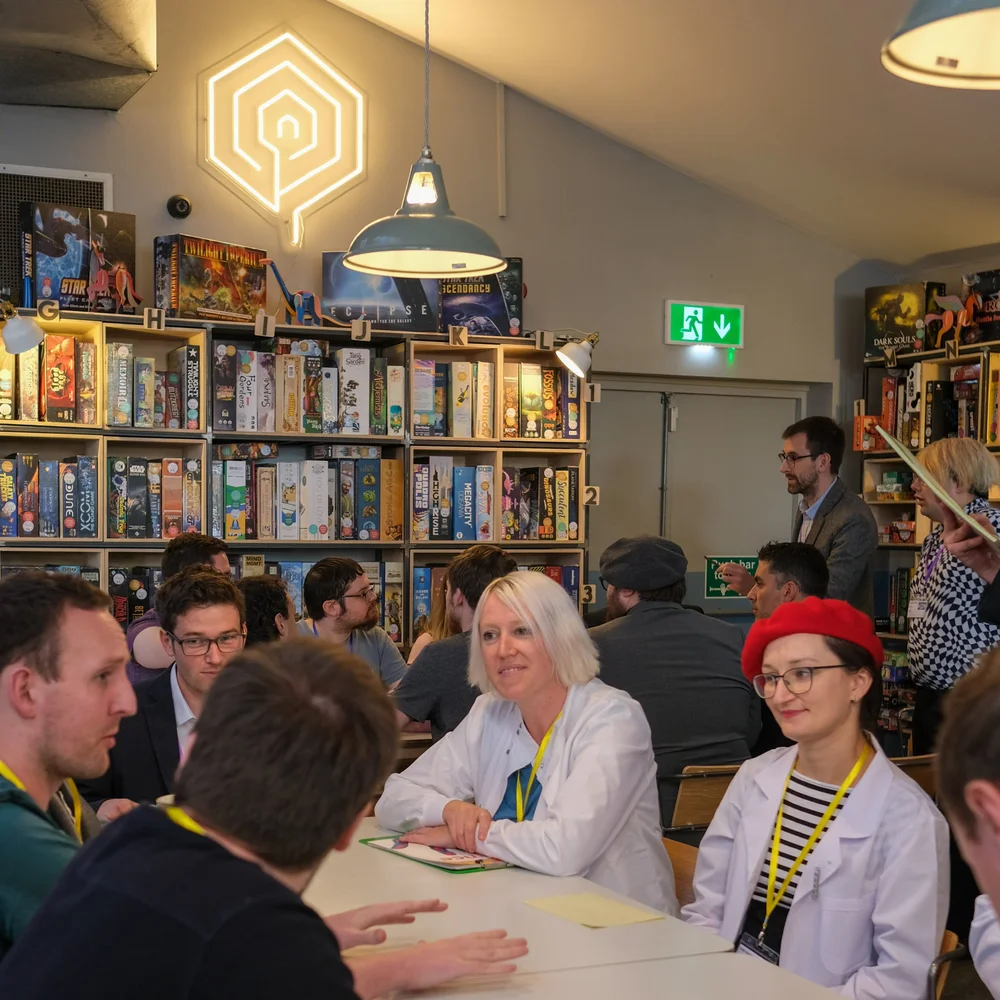
The International Science Conference in full swing View fullsize

Typically tense times at the UN Headquarters View fullsize

An alien visitation on the main map
There are two more players in the game that we haven’t mentioned yet: the Press. While money does exist in Watch the Skies, information is the game’s true currency, and the Press are its chief brokers. As well as maintaining a real life Twitter feed, this team have the incredibly challenging job of publishing an actual newspaper each round, which is distributed to all the world’s nations.
Teams get to choose what they share with the press, but players will need to stand up under questioning to keep their secrets safe: the Press are on the hunt for juicy stories, and once something is on the record there’s no going back!
View fullsize
Today's breaking news was broadcast to players on a big screen for all to see, in case players were too busy to check their phones View fullsize

The International Science Conference under scrutiny from the global media View fullsize

Reporters in the GNN headquarters discuss today's top story View fullsize

There aren't many games where you get a real life newspaper delivered at the end of every round summarising that turn's events!
At a high level, Watch the Skies has things in common with both a board game (there are rounds, objectives and quantitative trackers to keep tabs on) and a roleplaying game (storytelling is at the heart of the game, and there’s a LOT of freedom within the rules to be creative and add your own narrative elements). Having now experienced it for ourselves, we feel that the roleplaying aspect is the greater of the two: players are provided with the means to try out pretty much every idea they can come up with, and the sky isn’t even the limit! Expect some excellent examples of this shortly when we’ll tell you more about what happened in our game.
One final question you might be wondering about is: how do you win? The answer is… you technically don’t, although you’ll certainly have a rough idea of how well or badly things have gone for your team by the end!
Each team (including the aliens) begins with a set of objectives to try and achieve over the course of the game. Some of these are specific, for example the French team had an objective to ensure that the UK never gained a technological advantage over them by completing more scientific research or winning more Nobel Prizes. Others are more subjective: the USA had a goal to maintain their status as “the leading voice and guardian of freedom in the world”, which obviously provides plenty of scope for interpretation!
Alongside these goals, there are some quantitative trackers: each nation has a PR rating, essentially a measure of the popularity of that nation’s government. If this ever falls to zero then that government has fallen, with the exact consequences left up to the Control team to decide. There is also a global panic level tracker to keep an eye on, with serious repercussions for all nations if this exceeds certain thresholds.
At the end of the game, each Head of State is invited to debrief the rest of the the players on how well or otherwise the game went for their country, which as well as being extremely entertaining, does tend to reveal some overall winners and losers!
View fullsize
The President of France provides a debrief View fullsize

Plenty of great stories came to light in the final debrief View fullsize

The final debrief was from the alien team, which answered at least as many questions as it raised View fullsize

We salute the decision to stay in character to the very end
Our tale of extraterrestrial intrigue
It turns out that when 40 people play a narrative-based game for a whole day, there will be a whole lot of stories to tell!
One thing that isn’t clear when you hear about Watch the Skies in the abstract is the overall tone of the game, which can perhaps be best summed up with the phrase ‘barely controlled chaos’. This feeling of frantic energy is very much a feature rather than a bug: the structure of the game ensures that players are constantly bombarded with information, and put under pressure to make decisions without having the full facts, which is exactly what makes Watch the Skies such an adrenaline-fuelled romp.
In our game, the chaos began early, with the alien team constructing an elaborate plan to encourage global cooperation (and get around the limitations of their permitted word count) by sharing parts of their initial message across the nations of the world, only to run out of time and have their first contact reduced only to the words “Pope friend Brazil,” which certainly provoked plenty of chin scratching!
Although no nation chose to announce the arrival of aliens for several rounds, rumours hit the press almost immediately, with Japan making a puzzling statement to the press about an ‘unknown threat’ in the very first round. As well as rumours, bribes in the form of foodstuffs also began flying from the get-go, with the press even running a story under the heading ‘Biscuit Watch’ hinting at certain nation’s profligacy with baked goods, despite an ongoing famine in Uganda.
You can get a flavour of how the game progressed by perusing the issues of global newspaper The Branch below, which the exceptionally professional Press team delivered on time without fail during each round.
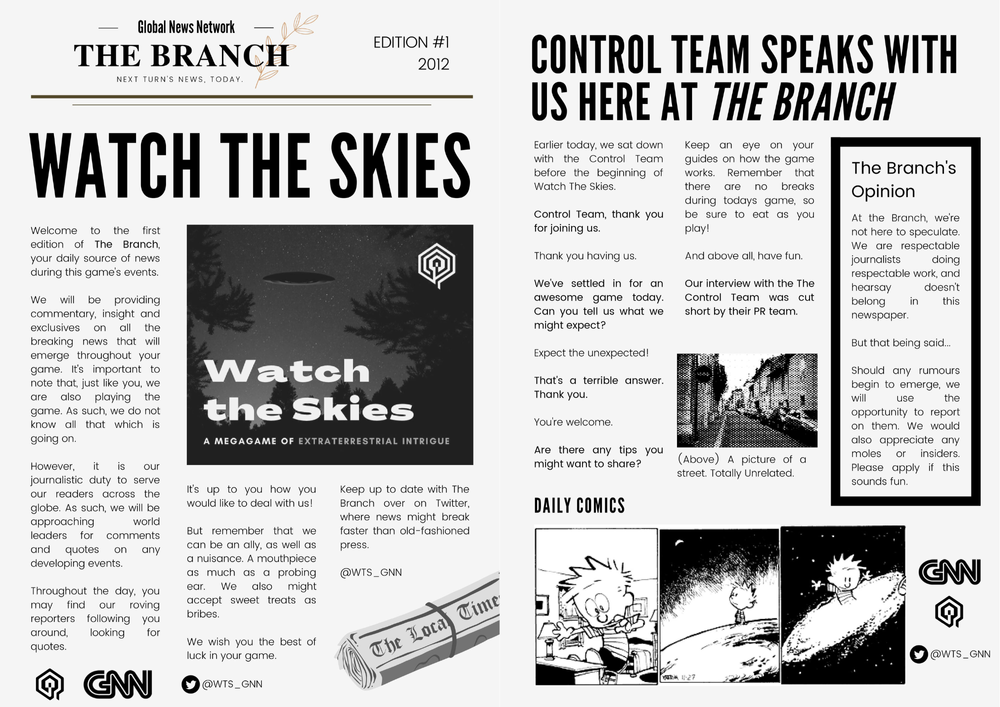
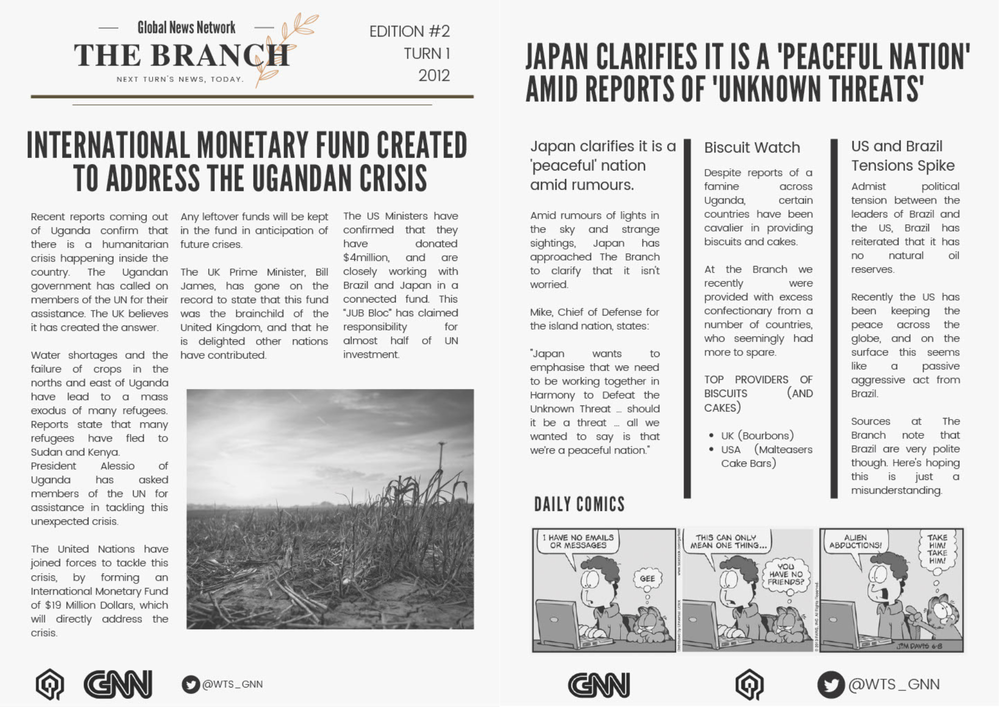







There’s no way to do justice to the full narrative that unfolded during the game as so much happened, but here are a few highlights and some favourite moments from players to give you a flavour of the scope and room for imaginative silliness that Watch the Skies allows…
The formation of FUKZIL
There’s so much flexibility in Watch the Skies that not even the team structure has to remain fixed. During the penultimate turn in the game, the world was astounded by the news that France, the UK and Brazil would be merging to form one “Meganation” in response to the alien threat, which would be named FUKZIL. A proud moment for humanity.

The government of the mighty Meganation of FUKZIL
The Olympic Games
OK, admittedly this addition to the game was of our own devising, but we decided to introduce a little something extra in round six of the game, by throwing the Olympic games into the mix. The headline result was the Prime Minister of the UK winning a gold medal in Beach Volleyball. It’s pretty safe to say that no one saw that coming.
View fullsize
View fullsize

A Bollywood remake of Star Wars?
As outside observers, we don’t feel equipped to do this one justice, so here’s the inside scoop from two of the players:
“My personal favourite moment was announcing the release of our eight-hour epic Bollywood Star Wars rip-off over the tannoy as a way to cover up the fact that we (India) were going DEFCON 1 as part of our unsuccessful plan to nuke the moon!”
“My absolute favourite moment on my team (India) was our plan to cover up the alien invasion by using code words related to a science fiction Bollywood film. We spent $10M to realise our hit movie “Space Sabers: the Return of the New Hope”, an eight-hour epic featuring a two-hour-long dance section, which additionally starred the Olympic gold medal-winning UK Prime minister. Getting that published in the newspaper and announcing it over the mic along with our move to DEFCON 1 made my evening.”
And finally, a perspective from Russia…
We feel this gives an insight into the incredible number and range of stories told during a single game of Watch the Skies: no two players will have had the same experience or viewed proceedings in the same way.
“Once our chief Russian scientist (somehow) managed to negotiate getting direct access to the aliens, we immediately decided they were a force for good and that the Chinese team had been right in trying to protect the aliens from hostile interceptors. From then on, we basically decided that anyone still attacking them was a threat to humanity and decided we'd take any action up to and including deploying our nukes to neutralise unforgivably short-sighted anti-alien aggression.
After we defended some alien landings in Siberia and China, and heard that the USA had gone to DEFCON 1 after our foreign minister was assassinated, we were certain that we, China and Japan were about to face a full combined-arms attack led by the US. Without much money left to spend on defence, we pre-committed to trying for a first strike on America to leave their government in chaos.
It turned out (I think?!) that the aliens lied to us, no-one was immune to the space-plague, and the US never launched their nukes at us after a global espionage surge disarmed them, so the end of the game left the US functionally in chaos, a deadly alien plague spreading in Europe, and Russia probably facing a conventional army attack by most of the Western world in retaliation for incinerating San Franciso...”
View fullsize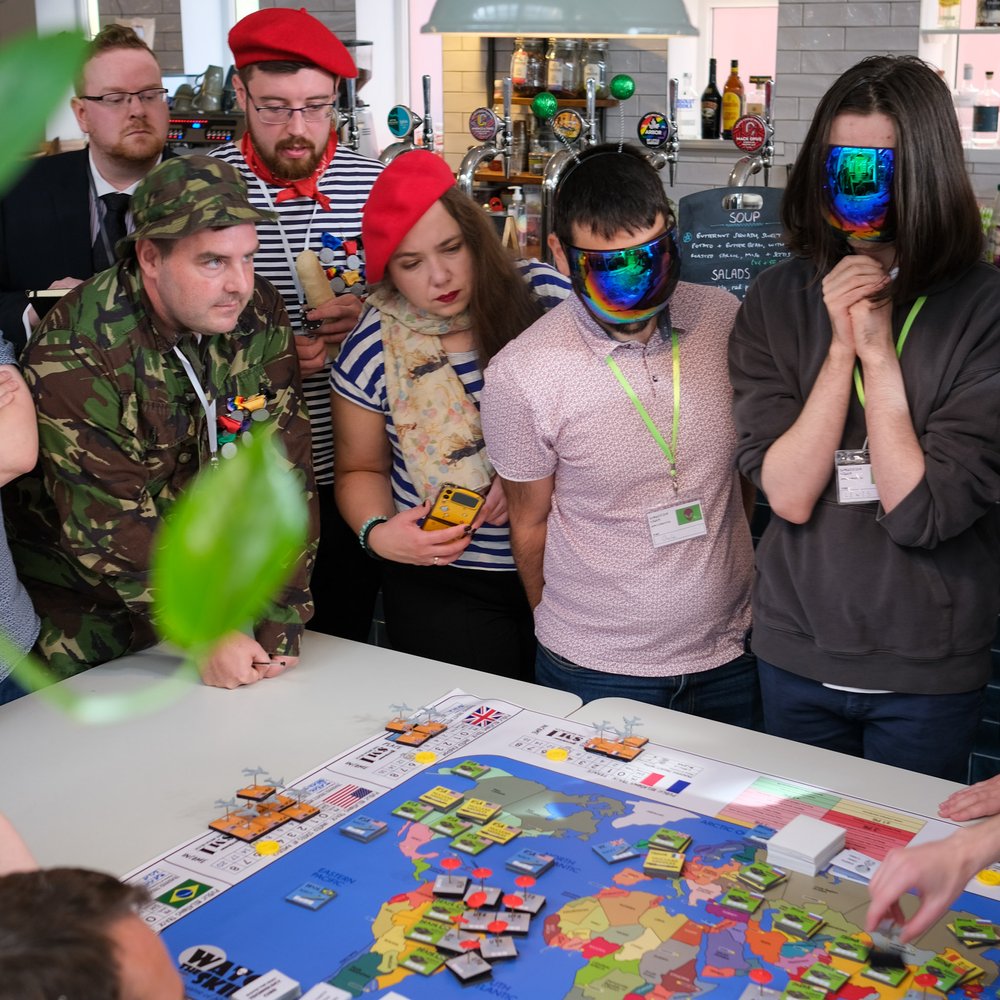
View fullsize

View fullsize
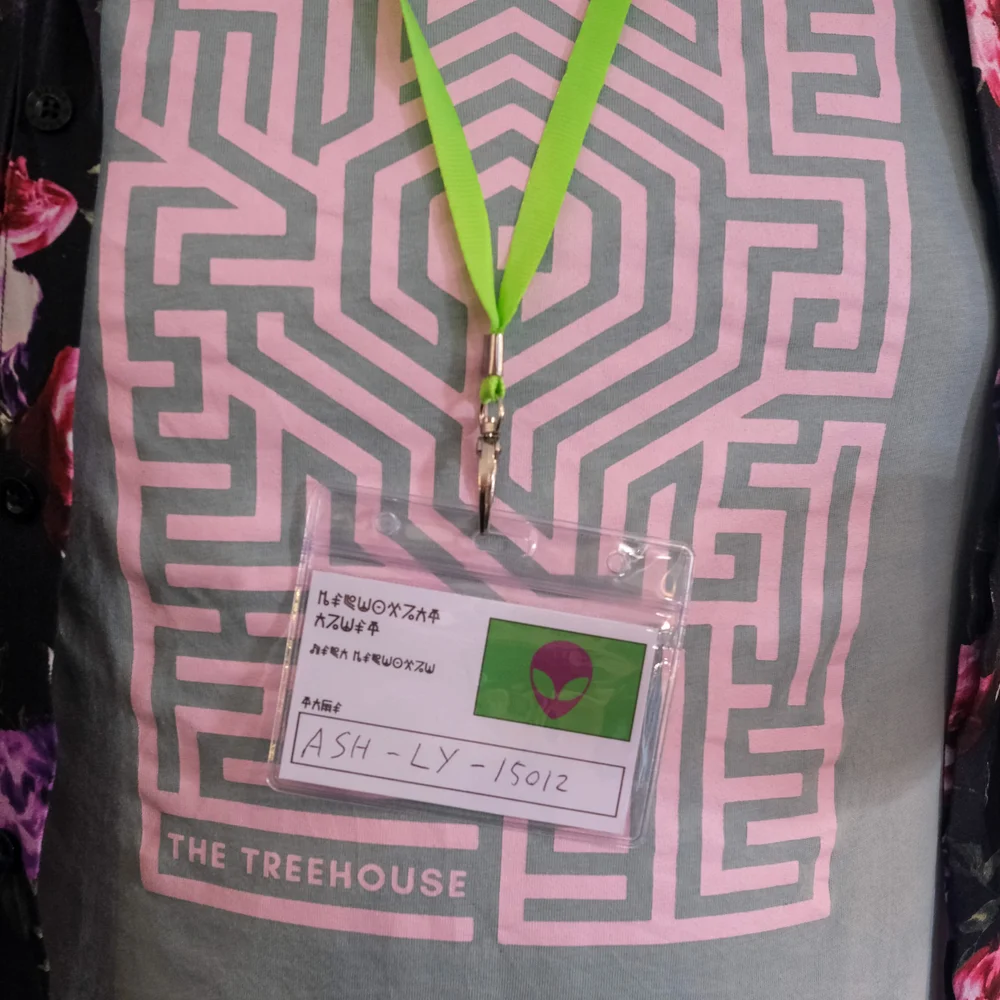
View fullsize

Watch The Skies This Space…
The story that unfolded during our game of Watch the Skies may be a little murky in places, but one thing is very clear: we had a fantastic time running it and we’re pretty sure the participants had fun playing it, so we’d very much like to do it again sometime!
We all came away from last month’s game bubbling over with ideas for tweaks and new additions to keep the game fresh on future play-throughs, so you can expect Watch the Skies to make a return in the not-too-distant future. Until then, farewell Earthlings…

Aliens observe the choas on Earth from the safety of their space base










